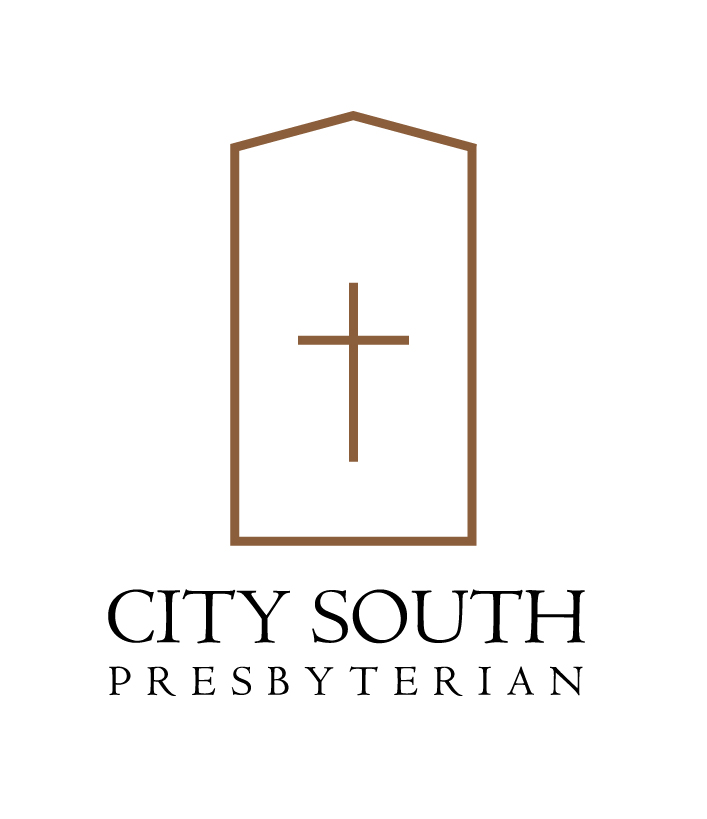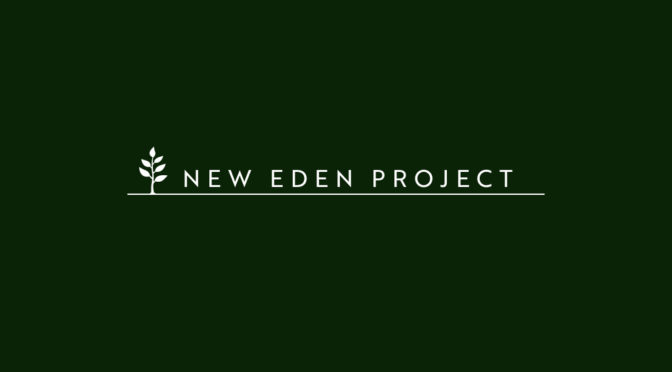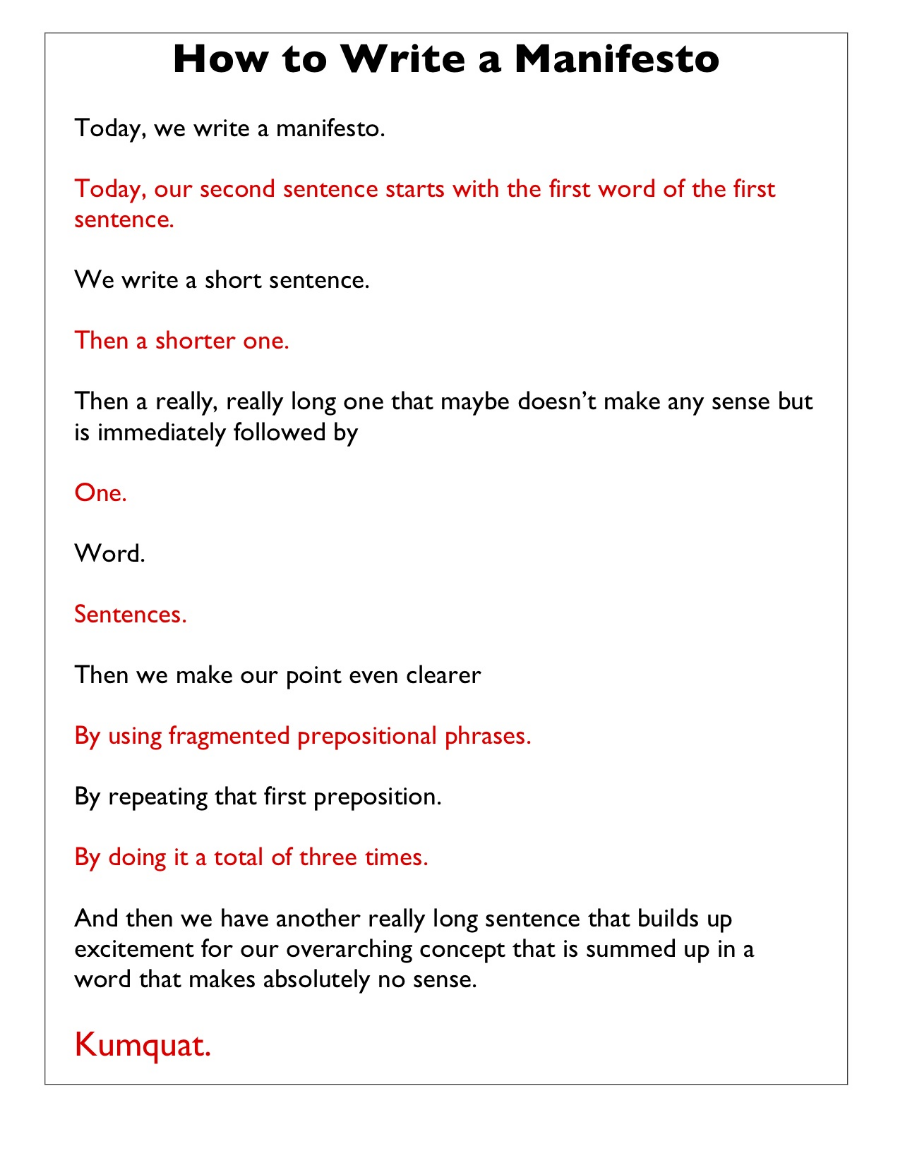Manifestos are cool. Here’s a bit of a primer on what this is for in the form of a preamble. I did not follow the convention on Manifestos that I said I would back in 2011. Sorry.
The New Eden Project
“Certainly there was an Eden on this very unhappy earth. We all long for it, and we are constantly glimpsing it: our whole nature at its best and least corrupted, its gentlest and most humane, is still soaked with the sense of ‘exile.” — Tolkien
Why the “New Eden Project”
The story of the Bible anticipates a re-creation; what was lost in the beginning is ultimately restored and renovated; what was a garden created for God’s image bearing people to “cultivate and keep” is, in the end, spread across the face of the earth. The last page of the Bible describes the scene this way:
Then the angel showed me the river of the water of life, as clear as crystal, flowing from the throne of God and of the Lamb down the middle of the great street of the city. On each side of the river stood the tree of life, bearing twelve crops of fruit, yielding its fruit every month. And the leaves of the tree are for the healing of the nations. No longer will there be any curse. The throne of God and of the Lamb will be in the city, and his servants will serve him. — Revelation 22:1-3
The prophet Ezekiel describes the end of exile from God as a return to Eden — a re-creation and restoration of humanity from the inside out, and a return to God’s presence. Ezekiel chapters 36 and 37 are full of vivid language, prophecies, describing this renewal. Ezekiel promises God’s scattered people, Israel, will be returned and restored, and through this, God’s promise to bless all nations will also be fulfilled. Israel’s return from exile makes return to Eden possible for all of us…
“‘For I will take you out of the nations; I will gather you from all the countries and bring you back into your own land. I will sprinkle clean water on you, and you will be clean; I will cleanse you from all your impurities and from all your idols. I will give you a new heart and put a new spirit in you; I will remove from you your heart of stone and give you a heart of flesh. And I will put my Spirit in you and move you to follow my decrees and be careful to keep my laws. — Ezekiel 36:24-27
Jesus, the son of God and the new Adam, comes to lead Israel home, and all nations back to Eden. It is Jesus who, in Revelation, “makes all things new.” It is Jesus in whom “all things are reconciled.” Jesus, the image of the invisible God, is the new image that we God’s people are transformed into by the Holy Spirit. It is Jesus who pours out the Holy Spirit as the fulfilment of the Old Testament promises to restore and recreate God’s people. When Jesus enters the world as ‘God with us’ and then, with the father, pours out the Holy Spirit, our exile from God ends; the new Eden project begins.
The liberation of creation begins with Jesus, and his kingdom of resurrected people living lives filled with the Holy Spirit. In his letter to the church in Rome the Apostle, Paul talks about the whole creation being under bondage to the curse of sin; subject to decay; he says the creation waits for the ‘revelation’ or literally the apocalypse of the children of God for its liberation. He says the Spirit marks us out as God’s children (Romans 8:16-17), and in the Spirit, we have the ‘firstfruits’ of this renewal.
This revelation and renewal ultimately happens in the new creation; the world is still broken; suffering because of sin, death, and curse, still marks our reality. We’re still waiting for the total renewal of all things. We wait eagerly for this future; but we do not wait idly. We are invited to testify to the future re-ordering of all things by re-ordering some things.
We are new creations in Christ. For us the “old is gone” and the “new has come.” We are already united to the resurrected Jesus whose new Eden project is already underway. We live in the ‘now and not yet’ of his kingdom. Our lives, our bodies (as temples of the Spirit), and the places we occupy, are part of the New Eden Project. The longing for the end of exile, for Eden, that Tolkien identified is fulfilled by Jesus but we are invited to provide a taste of Eden here and now.
What is the New Eden Project
The New Eden Project is Jesus’ mission — the mission to “seek and save the lost” and the re-creation and reconciliation of all things. The “Great Commission” to go into the world and make disciples (Matthew 28) is a renewing and renovating of the commission to the first people, in Genesis 1, to “be fruitful and multiply, fill the earth and subdue it” — to spread the conditions of Eden.
The New Eden Project is our project as a community of people gathered by Jesus and called to make disciples; to invite people to be transformed into the image of Jesus as they receive the Holy Spirit and become citizens of the New Eden. We go knowing that “Jesus is with us always, even to the end of the age” — our exile from God’s presence is over. God is with us, he dwells in us by his Spirit.
A project is action — it is action pursuing some sort of future. Our project is to act in a way that pursues and participates in the New Eden described when Jesus returns to make everything new.
The New Eden has some continuity with the Old Eden; what humanity was created for before sin and death entered the world is what we are re-created for in Christ. We were created, male and female, to be God’s image bearing people in the world, to be like God, to imagine and create, to be “fruitful and multiply” — to expand God’s life-giving, hospitable, loving kingdom — his presence — over the face of the earth as we ruled for him. In Eden, Adam was given the job of “cultivating and keeping” the garden, a task he couldn’t complete alone. Eve was created as Adam’s ally — his partner — in this task. Taken together, Genesis 1 and 2 give us the picture that humans — male and female — are created to co-operate in the task of spreading Eden, God’s temple-like dwelling place where he is present with his people across the face of the earth, a result we finally see in Jesus’ work in the New Eden.
Genesis teaches us that God made the world and made us to partner with him in stewarding it. The Bible also consistently describes the world as part of how we know God (Psalm 19, Romans 1). Eden, like the Temple that later is an echo of Eden, is the high point of the world fulfilling its function. Sin means we’re kicked out of Eden, and also that we don’t see the world according to God’s purposes for it, but rather our own. We have our own little kingdom building projects that lead to death and destruction because really they’re Satan’s building projects.
Our tasks, as children of God, in this New Eden Project, in a world exiled from God but haunted by a longing for Eden, are to:
- Re-narrate the world and our lives in it. The New Eden Project is shaped by the Eden to New Eden story of the Bible. The Bible is God’s word — it is also God’s story. This is the story of the life, death, resurrection, and ascension of Jesus, for the forgiveness of our sins and his pouring out of the Spirit to re-create and restore us, ending our exile from God replacing our sinful nature with something new. Our lives, our words, our songs, and our actions retell God’s story of salvation in Jesus; they tell not just of the forgiveness of our sins and a pie in the sky future, but our union in the life and love of God so that we become the ‘body of Christ’ in the world. We are a people who live with Jesus as our king and the mission of renewal as our mission. Though we know this mission is ultimately fulfilled in his return and we know that the world and our lives are still marked by sin, suffering, death and curse, we live as those raised with Christ and seated in the heavenly realm. We reject idolatry and grasping self-gratification and seek to bring all things, including our own lives, towards their ultimate ends (or purposes). We live bringing a taste of the resurrected new creation, living now in our persons and our community even in our suffering. We invite people to taste and see that God is good in our lives and spaces as we tell this story.
- Be Re-created by God’s Spirit, as we move from the patterns of this world, the pattern of Adam and Eve in the fall, to the pattern — or image — of Jesus, and so re-create our lives and the world in alignment with Jesus’ New Eden Project. Eden was a place of work and rest and play; it was a place of ‘re-creation’ as we people, made in God’s image, were to take up the task of ‘cultivating and keeping’ the garden using our God given imaginations and his good gifts to make life and culture (the conditions and creations that flow from pursuing life in God’s presence with him as our God). We work and ‘re-create’ (both rest and re-creation) with the goal of bringing the life and beauty and order of the God of the Bible into the world. We adopt habits consistent with this story and pursue transformation through a renewed mind as we let it dwell among us richly. We do this as people being re-created, in Jesus, by the Spirit, to be people of his eternal kingdom, anticipating the new creation, the new Eden. By the Spirit we are new creations now.
- Re-enchant our understanding of space, time, and our lives — because God has “broken in” to this world in Jesus (a cool place to notice this is in the tearing of the sky at the start of Mark, and the Temple curtain at its end), and through the pouring out of the Spirit, we reject the secular/sacred or natural/supernatural divide and see every moment as holy and the world as enchanted. We see creation as a gift from God and the proper use of creation as “revealing his divine nature and character of God” as we enjoy it and cultivate it with him present in our lives. We see work and rest and play as Spiritual practices that proclaim the kingdom we belong to and shape us in the image of the God we worship. We worship the God revealed in Jesus and serve him as our good and loving king. We seek to love God and love our neighbour as ourselves, living lives in his kingdom, participating in his renewing and reconciling mission, a mission that culminates in the New Eden.
- Re-sist the patterns of this world — by deliberately rejecting the pull of idolatry and by deliberately counter-forming ourselves through different practices. The nations of people exiled from God are often depicted after the Old Testament as ‘Babylon’ — this is particularly the case in Revelation, the last book of the Bible. Babylon has the power to capture the hearts of the people brought into its power, and its stories. We resist Babylon through deliberate acts of counter-formation and resistance (including cultural critique and protest or political action). We have our own distinct aesthetic and practices rather than imitating the world and its forms. This could be in something as radical as hospitality and sabbath, or as mundane as protest or tree planting. The catch is, there is no mundane because every part of our life is marked by the sacred.
- Re-imagine our relationships as we re-image our humanity in the image of Jesus, the image of the invisible God. We, as males and females, are invited to co-operate in Jesus’ project. The first witnesses to the resurrection — in the garden, where Jesus appears like a gardener, are women. We still, though anticipating a new Eden, live in a world whose patterns are shaped by the curse of Genesis 3, where men have used their strength to grasp for power and control.
- Re-claim space, time, and our bodies as ‘spaces’ where the New Eden is being anticipated and presented in the world as a taste of what is to come. We recognise our bodies as fundamental to our nature as image-bearing creatures. We are not just souls or minds waiting for some ‘disembodied’ future. How we use our bodies shapes our hearts and souls. We seek to love and serve Jesus as embodied people who belong to Jesus’ New Eden Project. We use our spaces — those we share, occupy, and own — to provide a taste of the sanctuary of Eden, both old and new. They are places of beauty and hospitality. Places where God is glorified and where we recognise his presence and provision. They are places of life and light and water.
- Re-plant ‘Eden’ in our homes, shared public spaces, and community spaces. There are lots of old buildings dedicated to worshipping God that have, at times, become too close to Babylon or that need new life. We commit to re-claiming and re-creating whatever space possible, ‘church building’ or otherwise, to be used towards the ends of God’s kingdom, bringing a taste of the New Eden and God’s presence in the world by whatever means possible. We are committed to ‘renewing’ (and so also renewables, recycling, and up-cycling). We also commit, in our resistance of Babylon, to re-plant natural spaces — to be ‘gardeners’ and stewards who ‘cultivate and keep’ the world God made — so that they reveal his divine nature and character, rather than our ravenous idolatry. We recognise that as humans sinfully degrade the planet this is evident in the natural world; and so we commit to an alternative pattern of life that stewards and re-creates the life-giving conditions of Eden wherever possible, from community gardens to tree-planting to our own backyards.
I have some ideas what a church community shaped by this sort of manifesto might look like. Do you? I’d love to hear them. I’ll share mine in a future post. If this sort of vision for church excites you, I’d love to hear that too. Also, if it leaves you cold and you think this is a diabolically bad idea, please tell me.


